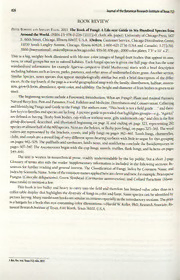
The Book of Fungi: A Life-size Guide to Six Hundred Species from Around the World by Peter Roberts, Shelley Evans PDF
Preview The Book of Fungi: A Life-size Guide to Six Hundred Species from Around the World by Peter Roberts, Shelley Evans
Journal of the Botanical Research Institute of Texas 7(2) BOOK REVIEW A Peter Roberts and The Book Shelley Evans. 2011. of Fungi: Guide Hundred Life-size to Six Species from Around the World. (ISBN-13: 978-0-226-721172-0, cloth, alk. paper). University of Chicago Press, 1427 60th E. Street, Chicago, Illinois 60637, U.S.A. (Orders: Customer Chicago Service, Distribution Center, 11030 South Langley Avenue, Chicago, Ilinois 60628, 1-800-621-2736 (USA and Canada), 1-773-702- 7000 (International), [email protected]). 2000 $55.00, 656 color plates, 7.5" x 11" x 2". pp., This is a big, weighty book illustrated with life-size color images of fungal fruit bodies that appear in ones, twos, or small groups but not in natural Each habitats. fungal species is given one full page that has the some standardized information: example for Agaricus campestris (Field Mushroom) with starts a brief description including habitats such as lawns, parks, pastures, and other areas of undisturbed short Another grass. section, Similar Species, notes species that appear morphologically similar but with a brief description of the differ- At ences. the top fourth of the page is a world geographical map with the family, distribution, habitat, associa- growth tion, form, abundance, spore color, and edibility. The height and diameter of fruit bodies given in an is The beginning sections include a Foreword; What Introduction; are Fungi?; Plant and Animal Partners; Natural and Recyclers; Pest Parasites; Food, Folklore and Medicine; Distribution and Conservation; Collecting and Identifying Fungi; and Guide to the Fungi. The authors book state, “This is not a field guide .” and there- . . fore keys to families and species are lacking. A picture guide provided groups— is that highlights “Agarics” e.g., are defined having as “fleshy fruit bodies, cap with or without stem, underneath and gills cap,” this the is first group discussed, and described, illustrated beginning on page 31 and ending on page 323, representing 292 species or almost half of the 600 Next species. are the boletes, or fleshy pore fungi, on pages 325-361. The wood rotters are represented by the brackets, and crusts, jelly fungi on pages 362-461. Tooth fungi, chanterelles, and clubs, corals are a mixed bag of very different spore-bearing surfaces with argue grouping little to for this on pages 462-505. The and puffballs earthstars, and bird’s nests, stinkhoms conclude the Basidiomycetes on pages 507-547. The Ascomycetes begin with cup the fungi, morels, and on truffles, flask fungi, lichens pages The text is written in nontechnical prose, readily understandable by the lay public, but a short 2-page Glossary of terms also aids the reader. Supplementary information included is in the following Re- sections: sources for further reading and general The interest. Common Classification of Fungi, Index by Name, and Index by Name. Some common Scientific of the names applied here are clever andnew, example, Beansprout for eliqU*SCenS) GreCn Skinhead Cortinarius ^J ( austrovenetus and (M ’ Collard Parachute aras- ), mte^olflahoi This book too bulky and heavy is to carry into the and field therefore has limited value other than as a coffee table display that highlights the diversity of fungi in color and form. Some by species can be identified Many picture keying. mushroom books are similar in content especially in the introductory The price sections. W is a bargain for a book this size containing color illustrations.—Hamid PhD, Bo- Keller, Research Associate, tanical Research Institute of Texas, Fort Worth, Texas USA. 76102, J. Batltes. Inst Texas 7(2): 826. 2013
